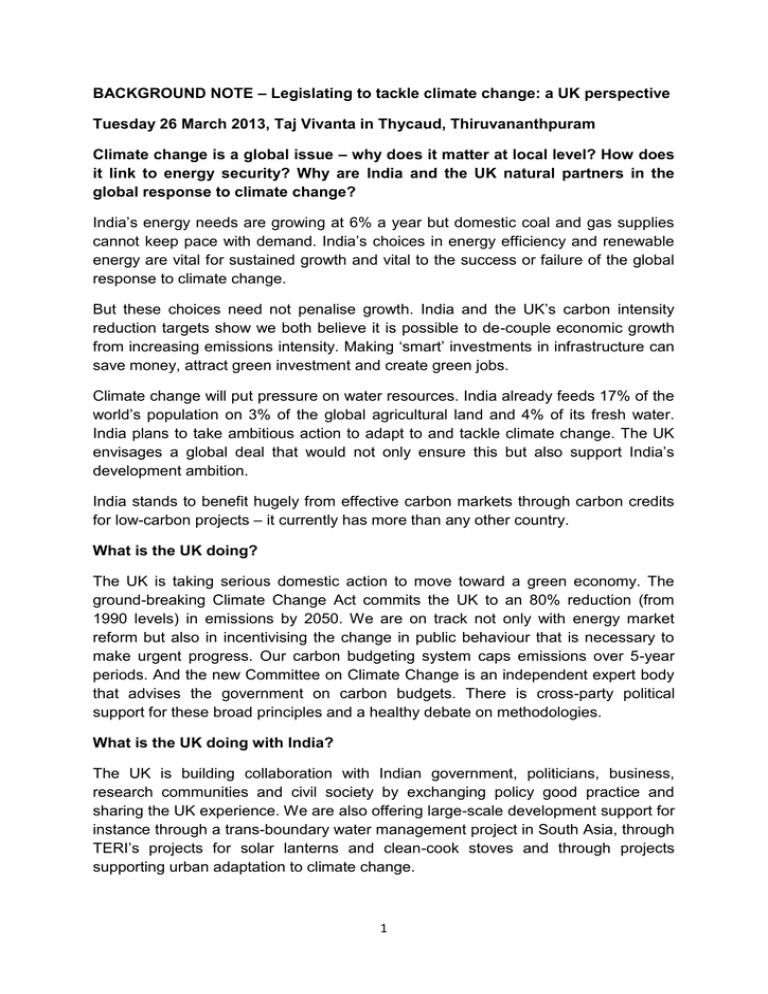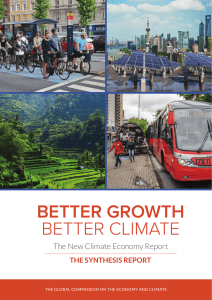RACHEL SPEECH
advertisement

BACKGROUND NOTE – Legislating to tackle climate change: a UK perspective Tuesday 26 March 2013, Taj Vivanta in Thycaud, Thiruvananthpuram Climate change is a global issue – why does it matter at local level? How does it link to energy security? Why are India and the UK natural partners in the global response to climate change? India’s energy needs are growing at 6% a year but domestic coal and gas supplies cannot keep pace with demand. India’s choices in energy efficiency and renewable energy are vital for sustained growth and vital to the success or failure of the global response to climate change. But these choices need not penalise growth. India and the UK’s carbon intensity reduction targets show we both believe it is possible to de-couple economic growth from increasing emissions intensity. Making ‘smart’ investments in infrastructure can save money, attract green investment and create green jobs. Climate change will put pressure on water resources. India already feeds 17% of the world’s population on 3% of the global agricultural land and 4% of its fresh water. India plans to take ambitious action to adapt to and tackle climate change. The UK envisages a global deal that would not only ensure this but also support India’s development ambition. India stands to benefit hugely from effective carbon markets through carbon credits for low-carbon projects – it currently has more than any other country. What is the UK doing? The UK is taking serious domestic action to move toward a green economy. The ground-breaking Climate Change Act commits the UK to an 80% reduction (from 1990 levels) in emissions by 2050. We are on track not only with energy market reform but also in incentivising the change in public behaviour that is necessary to make urgent progress. Our carbon budgeting system caps emissions over 5-year periods. And the new Committee on Climate Change is an independent expert body that advises the government on carbon budgets. There is cross-party political support for these broad principles and a healthy debate on methodologies. What is the UK doing with India? The UK is building collaboration with Indian government, politicians, business, research communities and civil society by exchanging policy good practice and sharing the UK experience. We are also offering large-scale development support for instance through a trans-boundary water management project in South Asia, through TERI’s projects for solar lanterns and clean-cook stoves and through projects supporting urban adaptation to climate change. 1 The UK is linking UK and Indian businesses and innovators working in the climate change and energy space. We have helped create an index of rating companies listed on the Bombay Stock Exchange (BSE) that is based on the London Stock Exchange (LSE)’s own index, reflecting company policies to conserve energy and reduce carbon – companies consistently outperform those not listed. We hope to attract more UK investment into such Indian companies. The UK is working with India’s Central government on its National Action Plan on Climate Change and with State governments on their State Level Action Plans. We are also helping make low-carbon inclusive growth a central pillar of India’s 12th FiveYear Plan. The UK is also working with Indian businesses and government to implement a Perform Achieve and Trade (PAT) scheme obliging energy intensive sectors to measure, report and improve their energy efficiency. We are working with India’s Bureau of Energy Efficiency and have helped develop a national energy efficiency trading scheme using the UK’s own industry scheme. Launched last year it covers 8 energy-intensive sectors including steel, cement and power. And through the Carbon Disclosure Project, we are helping the private sector publicly report its emissions and climate strategies and helping introduce energy efficient standards in key household appliances. How does today’s discussion with MLAs and Councillors in Kerala, fit in? Today’s discussion is one in a series of engagements with Indian legislators, whether they are Parliamentarians in New Delhi or State Assembly representatives in Thiruvananthapuram. UK action in India is two-fold. First, we support the GLOBE India chapter, which aims to increase awareness among parliamentarians and MLAs and develop legislation to tackle climate change. Second, we support Climate Parliament (CP) in India which aims to lobby for an increase in the government’s renewable energy generation target and an increase in government spend on renewable energy. We also directly engage with Indian MPs to engage them on these key issues. The UK’s ambition to engage with Kerala on climate change builds on a strong platform of existing engagement, covering trade, investment more broadly and healthcare in particular. We hope this partnership will grow from strength to strength. 2






